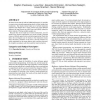114 search results - page 9 / 23 » Using likely program invariants to detect hardware errors |
149
Voted
ISSTA
2012
ACM
13 years 4 months ago
2012
ACM
We introduce the concept of “residual investigation” for program analysis. A residual investigation is a dynamic check installed as a result of running a static analysis that ...
110
click to vote
DAC
2008
ACM
15 years 4 months ago
2008
ACM
Security of MPSoCs is an emerging area of concern in embedded systems. Security is jeopardized by code injection attacks, which are the most common types of software attacks. Prev...
121
Voted
VTS
2008
IEEE
15 years 8 months ago
2008
IEEE
With increasing IC process variation and increased operating speed, it is more likely that even subtle defects will lead to the malfunctioning of a circuit. Various fault models, ...
100
Voted
CCS
2010
ACM
15 years 2 months ago
2010
ACM
We show that on both the x86 and ARM architectures it is possible to mount return-oriented programming attacks without using return instructions. Our attacks instead make use of c...
107
click to vote
ECBS
2007
IEEE
15 years 8 months ago
2007
IEEE
Automated diagnosis of errors detected during software testing can improve the efficiency of the debugging process, and can thus help to make software more reliable. In this pape...

